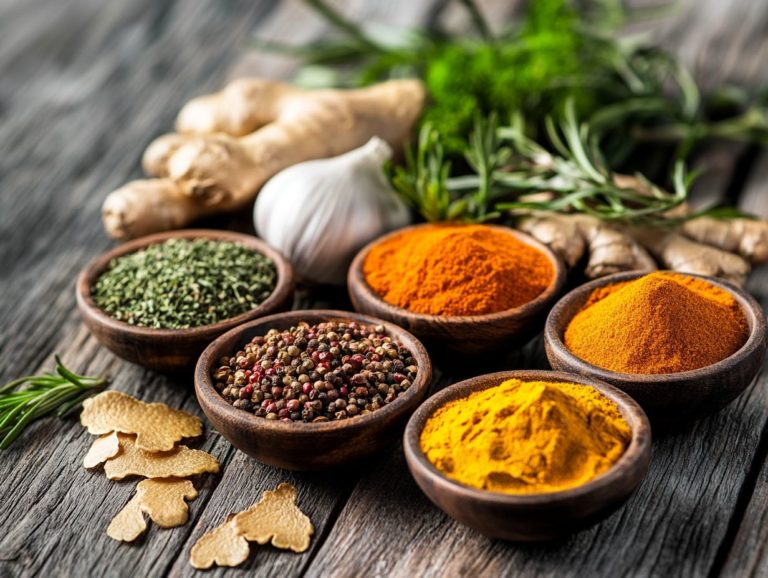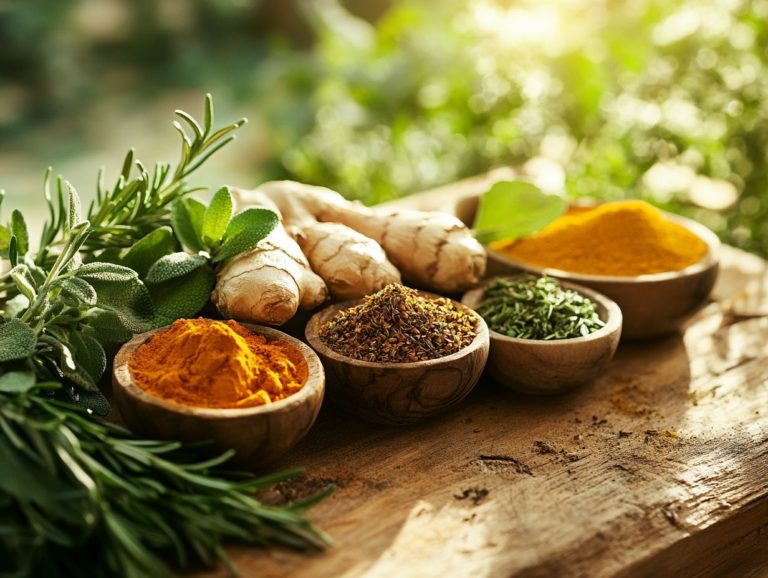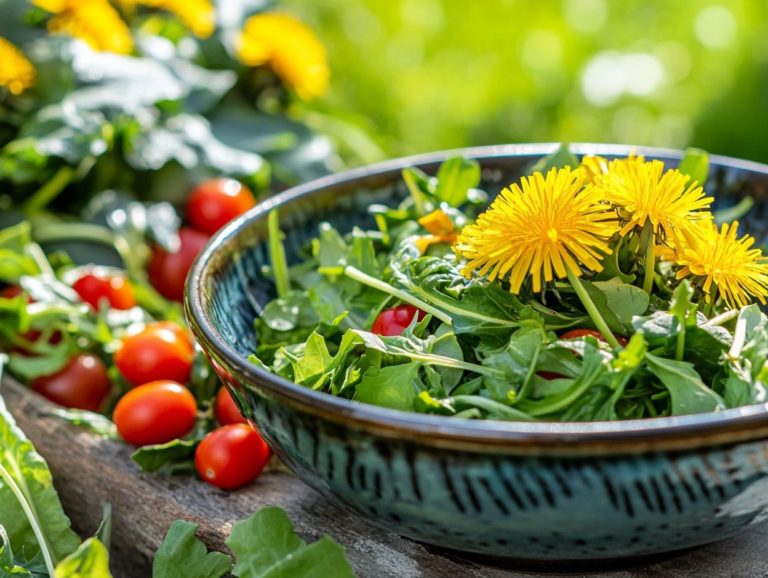5 Essential Herbs for Gut Health
Maintaining a healthy gut is paramount for your overall well-being, impacting everything from digestion to immunity. Let s dive into how five remarkable herbs ginger, turmeric, peppermint, fennel, and licorice root work wonders for your gut health.
In this article, you ll discover how these herbs operate, explore their additional advantages, and receive practical insights on how to seamlessly integrate them into your diet. We ll also discuss important precautions to keep in mind and share further natural strategies to elevate your gut health. Don t miss out on these amazing benefits!
Contents
Key Takeaways:
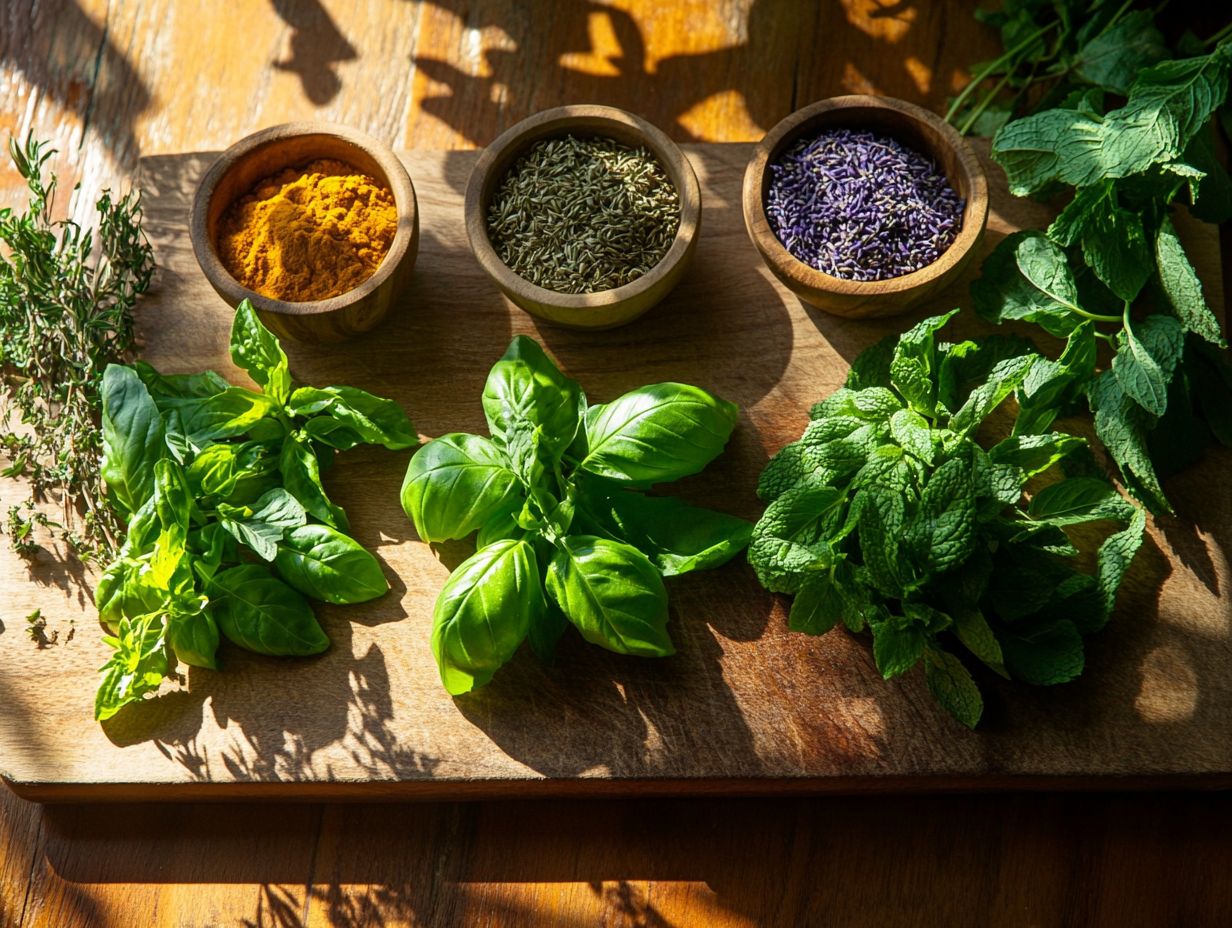
Ginger, turmeric, peppermint, fennel, and licorice root are 5 essential herbs that can improve gut health. These herbs have anti-inflammatory and antimicrobial properties that support digestion and alleviate gut issues. For more on how these herbs contribute to well-being, explore the connection between herbs and gut health. Adding them to meals or drinking them as teas can also provide other health benefits, such as reducing nausea and improving immune function.
1. Ginger
Ginger is a root with many health benefits, especially in promoting digestive health and alleviating stomach issues. If you re looking for natural remedies for digestive problems, ginger is likely already on your radar.
The compounds found in ginger, like gingerol and zingerone, are renowned for enhancing digestion and reducing inflammation. This helps cultivate a more balanced gut environment.
Nutrition experts, such as Elizabeth Shaw, often underscore how easy it is to incorporate ginger into your daily meals. You can grate it into stir-fries, blend it into smoothies, or steep it as a calming tea. Ginger also tackles bloating effectively.
Its anti-inflammatory properties are essential for maintaining overall health. It s no wonder that many people embrace this natural powerhouse as a staple in their diets. Try adding ginger to your next meal and feel the difference!
2. Turmeric
Turmeric, often celebrated as a superfood, is known for its remarkable anti-inflammatory properties that significantly enhance gut health and maintain gastrointestinal balance. This makes it a vital component in both traditional medicine and contemporary dietary guidelines.
The active ingredient, curcumin, takes center stage with its potent antioxidant effects, effectively combating oxidative stress and safeguarding the body from various ailments.
Experts, including Alyssa Pike, emphasize the value of curcumin in promoting digestive efficiency. This means it can enhance how well your body absorbs nutrients and foster a healthy microbiome.
By weaving turmeric into your daily meals, you can savor a delightful array of flavors while tapping into its potential health benefits, paving the way for improved overall wellness and vitality.
3. Peppermint
Peppermint, a beloved cooking herb, is not only admired for its refreshing flavor but also for its remarkable capacity to enhance digestive health. It promotes digestive enzyme activity and soothes the gastrointestinal system, making it a favorite among nutrition experts.
Its unique herbal properties work wonders by relaxing the smooth muscles lining your digestive tract. This relaxation reduces the cramping and discomfort that often accompany digestion. By easing tension in these muscles, peppermint allows for smoother digestion, facilitating the free movement of food through your system.
Many experts suggest incorporating peppermint tea or oil into your balanced diet, particularly after meals, to fully enjoy its soothing effects. This natural remedy can effectively support those who experience bloating or indigestion, aligning perfectly with dietary guidelines that emphasize whole foods and herbal supplementation.
4. Fennel
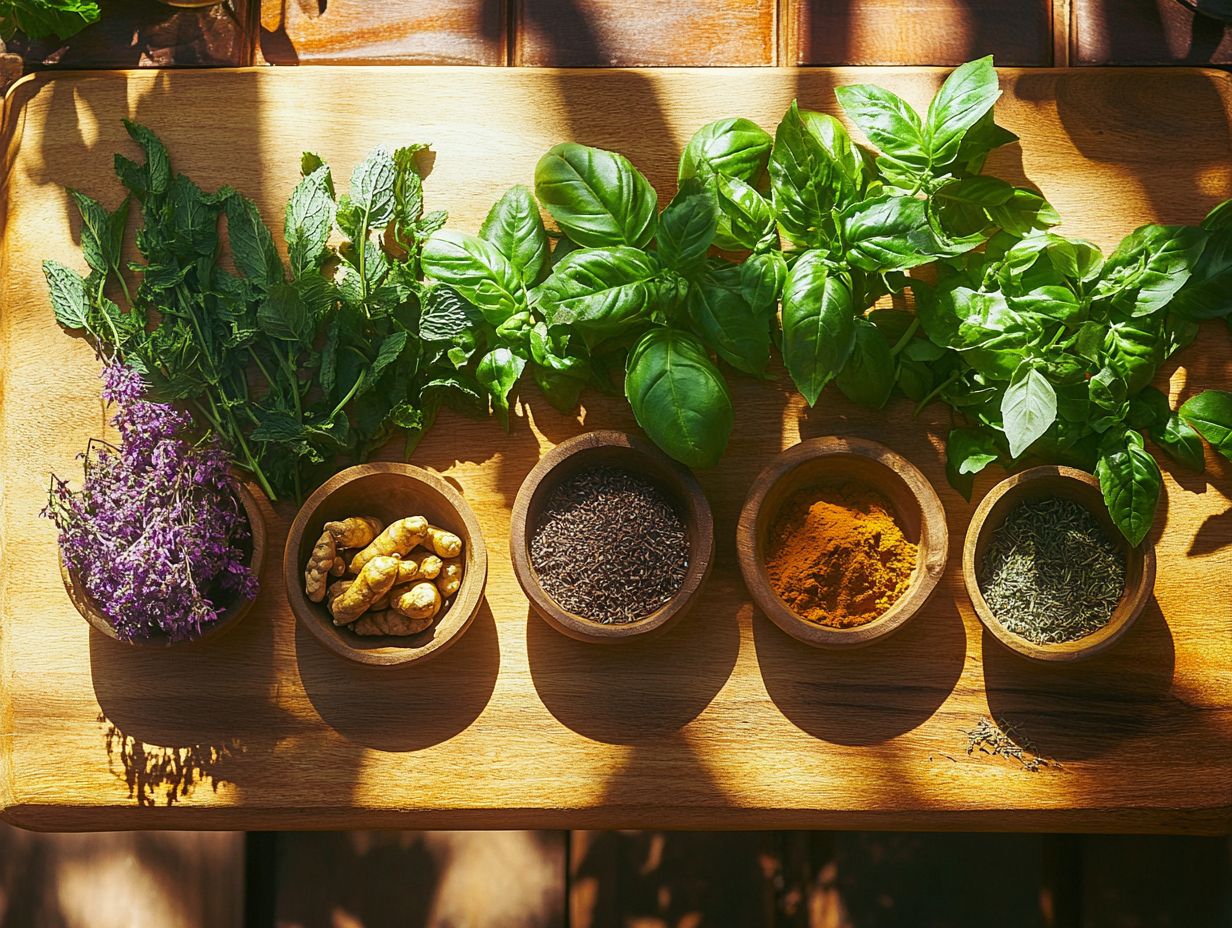
Fennel is a remarkable herb that not only elevates the flavor of your dishes but also offers a wealth of benefits for various digestive conditions. It promotes healthy gut bacteria and enhances nutrient absorption, making it a valuable addition to your balanced diet.
Research shows that fennel contains compounds specifically designed to help with bloating and gas, providing much-needed relief after meals. Studies published in reputable journals like “Food and Function” highlight fennel s ability to boost digestive enzyme activity, facilitating smoother digestion.
This herb also helps manage stress factors that can disrupt gut health. Experts suggest that fennel s aromatic properties may have calming effects, which is crucial since high stress can wreak havoc on proper gut function.
By incorporating fennel into your daily routine whether through a soothing tea or as a seasoning in your meals you can effortlessly support your digestive health.
5. Licorice Root
Licorice root stands out as a treasured herbal remedy, renowned for its remarkable ability to support digestive health. If you’re looking to help with gastrointestinal issues and reduce inflammation, this herb could be your go-to for health optimization and natural healing.
This extraordinary herb is packed with compounds like glycyrrhizin, which are known to soothe your gut lining and promote mucus production. This creates a protective barrier against irritants. Its antifungal and antibacterial properties can help restore balance to the community of bacteria in your gut, enhancing your overall digestive function.
Experts often suggest incorporating licorice root into your balanced diet, whether through teas or tinctures, to fully harness its potential. It’s especially beneficial for those dealing with bloating or heartburn, providing a gentle yet effective solution to common digestive complaints.
What Is Gut Health and Why Is It Important?
Gut health signifies the optimal functioning of your gastrointestinal system, marked by a harmonious gut microbiome, efficient nutrient absorption, and a robust immune response. It s not just a buzzword; it s essential for your overall well-being and a crucial factor in warding off various health risks and chronic diseases.
A thriving gut microbiome brims with beneficial bacteria that play a vital role in digestion, nutrient assimilation, and guarding against harmful pathogens. These microorganisms are like your body’s unsung heroes, producing compounds that can positively influence your mood and cognitive function, underscoring the intricate gut-brain connection.
By adopting dietary habits that include fiber-rich foods and fermented products, you can enhance this bacterial equilibrium. Your lifestyle choices also greatly impact your gut health.
This highlights the importance of comprehensive dietary recommendations aimed at optimizing both your physical and mental health while bolstering your immune support.
How Do These Herbs Help with Gut Health?
The herbs in discussion—ginger, turmeric, peppermint, fennel, and licorice root—play a pivotal role in promoting gut health. For those interested in herbal remedies, the 5 must-have herbs for herbalists enhance digestive efficiency, boast antimicrobial properties, and provide natural remedies that ease various digestive discomforts.
Each of these herbs works through unique mechanisms that support gut function, making them invaluable additions to your balanced diet, as highlighted in the 5 popular herbs and their health benefits.
For example, ginger stimulates the production of digestive enzymes, helping you break down food more effectively. Turmeric, with its curcumin content, is celebrated for its anti-inflammatory benefits, potentially reducing gut inflammation and fostering a healthier intestinal lining.
Peppermint, rich in menthol, has the ability to relax gastrointestinal muscles, offering relief from bloating and gas. Fennel seeds are known for their carminative properties, aiding in the expulsion of gas.
Licorice root soothes the gut lining and has long been recommended in traditional medicine for digestive issues. When combined, these herbs not only enhance your individual wellness but also contribute to a holistic approach to gut health!
What Other Benefits Do These Herbs Have?
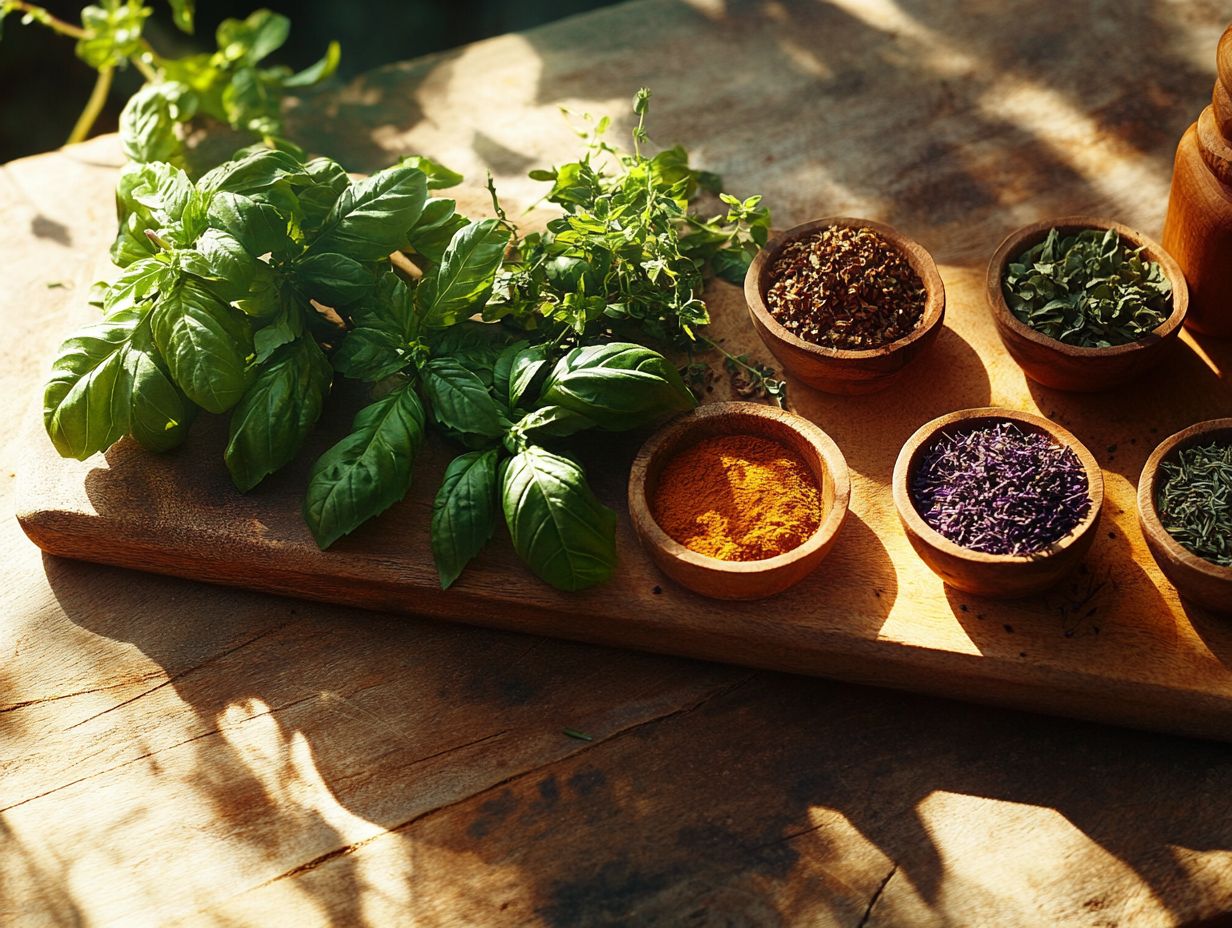
Beyond their remarkable contributions to gut health, these herbs offer a wealth of health benefits. They provide stress relief, manage inflammation, and fight off harmful substances in the body, making them vital components in both traditional and modern diets. For specific guidance, explore herbal remedies for common digestive issues.
Many of these herbs, like turmeric and ginger, have undergone extensive research highlighting their ability to reduce inflammatory markers in the body an invaluable asset for those struggling with chronic conditions. They play a vital role in strengthening your immune system, helping you fend off infections more effectively.
Certain herbs even enhance mental clarity and promote better sleep patterns, showcasing their versatility in holistic health practices. By incorporating these herbs into your daily routine, you can unlock their comprehensive healing properties, fostering not just gut health but overall wellness in countless ways.
How Can These Herbs Be Incorporated into a Diet?
Incorporating these beneficial herbs into your diet is a delightful endeavor. Nutrition experts like Elizabeth Shaw recommend various food choices and cooking methods. These herbs not only enhance gut health but also elevate the flavor profile of your meals.
Begin by adding fresh basil or oregano to your pasta dishes, using about one tablespoon of chopped herbs per serving. This simple addition amplifies taste without piling on excess calories.
For a refreshing salad, sprinkle a teaspoon of dill or cilantro on top of each dish. This adds a zesty kick while increasing your vitamin intake.
Consider blending rosemary or thyme into your marinades for meats, allowing the herbs to meld beautifully with about a teaspoon per serving. Infusing soups with herbs like sage can heighten their richness; aim for a tablespoon for an entire pot.
Always remember to wash your herbs thoroughly and keep dietary restrictions in mind, as some individuals may have sensitivities.
Are There Any Precautions or Side Effects to Consider?
While these herbs offer a wealth of benefits, it’s crucial to consider any precautions or potential side effects, especially if you have specific digestive conditions or are at risk for health complications. This ensures safe and effective use.
Be mindful of how these herbs may interact with any prescribed medications you re taking, as certain combinations can lead to undesirable reactions. Some herbs might either enhance or inhibit the effectiveness of blood thinners or blood pressure medications.
Therefore, it’s advisable to consult your doctor before introducing new herbal supplements into your routine. Start with small doses to assess how your body responds, all while maintaining a balanced diet that’s rich in fiber and hydration.
Taking these steps can further bolster your digestive health, allowing you to enjoy the benefits of herbs without unnecessary risks.
What Are Some Other Natural Ways to Improve Gut Health?
Incorporating beneficial herbs is just the beginning; you can enhance your gut health through various natural remedies. Consider increasing your fiber intake, nurturing healthy bacteria, and managing stress all essential elements for a robust gastrointestinal system.
A balanced diet is pivotal, with a clear focus on whole foods like fruits, vegetables, and whole grains. Integrating fermented foods such as yogurt, kimchi, and sauerkraut into your meals introduces probiotics that support the growth of beneficial gut flora.
Staying hydrated and practicing mindful eating are also key strategies to regulate digestion. Regular physical activity boosts your overall wellbeing and supports gastrointestinal function.
By embracing these lifestyle changes and dietary recommendations, you can cultivate a healthier gut, ultimately enhancing your overall health and vitality.
Frequently Asked Questions
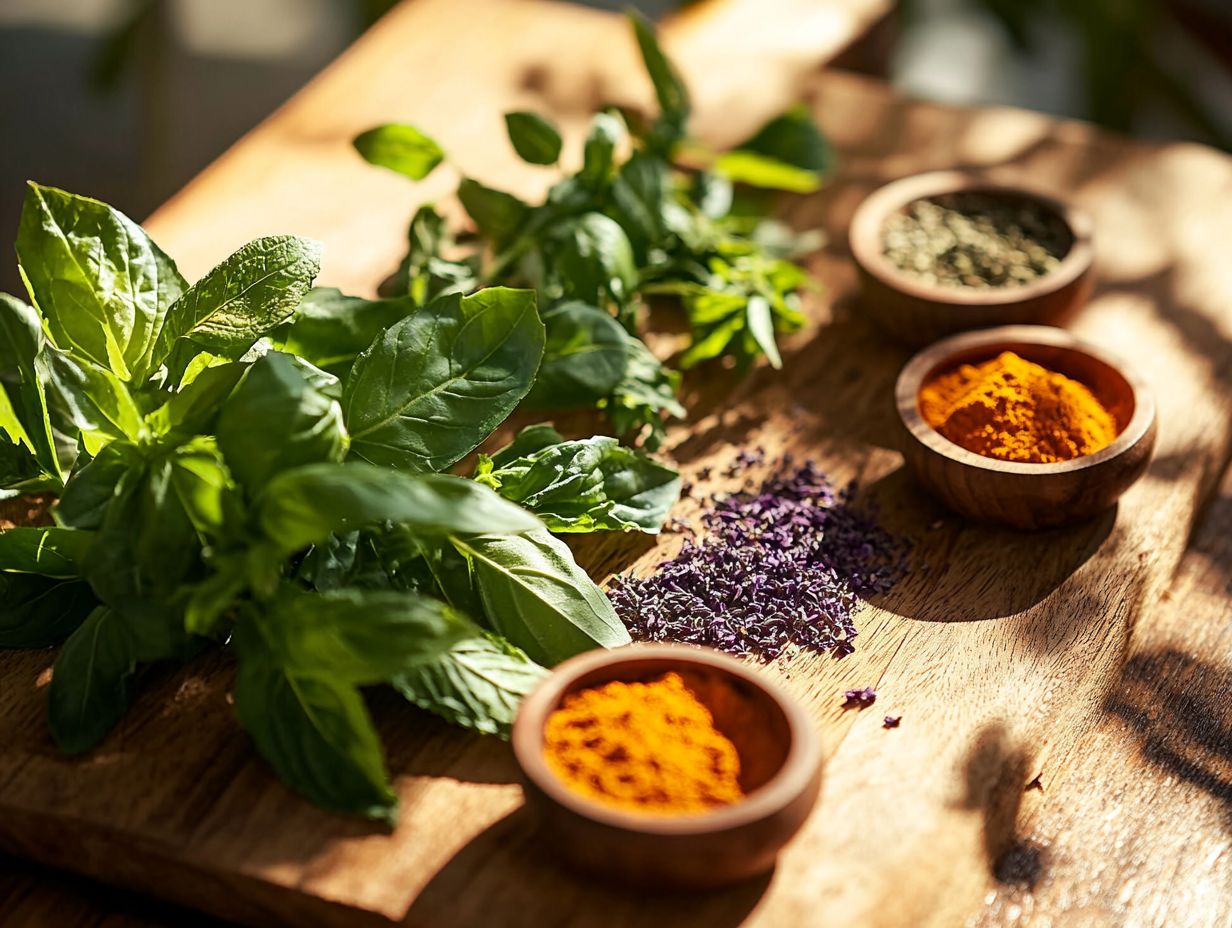
What are the 5 essential herbs for gut health?
The 5 essential herbs for gut health are ginger, peppermint, fennel, turmeric, and licorice root.
Start incorporating these herbs into your meals today for better gut health!
How do these herbs benefit gut health?
Ginger, a common spice, is known for its strong flavor and health benefits. It helps reduce inflammation in the gut. Peppermint aids in digestion and relieves bloating.
Fennel soothes the digestive tract, turmeric helps reduce swelling, and licorice root supports a healthy balance of gut bacteria.
Can these herbs be taken together?
Yes! These herbs can be taken together for maximum gut health benefits. However, always consult with a healthcare professional before starting any new supplement regimen.
Are there any potential side effects of these herbs?
These herbs are generally safe for consumption. However, some people may experience side effects like an upset stomach or allergic reactions.
Start with small doses to see how your body responds!
What is the best way to consume these herbs for gut health?
These herbs can be consumed in various forms, such as teas, powders, capsules, or tinctures. Choose the form that is most convenient and effective for you.
Are there any precautions to take when using these herbs?
Some herbs may interact with certain medications, so consult with a healthcare professional if you are on any medication. Pregnant or breastfeeding women should consult with their doctor before taking these herbs.

